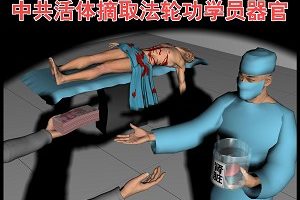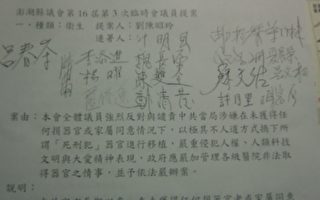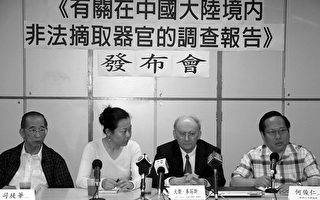【大紀元8月9日訊】中國政府從1999年7月開始對非暴力法輪功學員展開有系統的迫害﹐這是自文化大革命以來,在中國境內對一個文化團體所進行的人權侵犯最嚴重的一次。這是獨立於常規司法程序的鎮壓計劃。這樣的迫害必須立刻停止。
此外,目前已有越來越多令人信服的證據,證實法輪功學員被迫成為中國境內人體器官移植的供體。這意味著這一項人權迫害有醫學界的參與,這樣的迫害自1940年代以來還未曾被記錄在案。接受這種器官的人許多是來自馬來西亞、日本、歐洲及美國的患者。
2006年7月6日,加拿大律師大衛。麥塔斯(David Matas)及前亞太司司長大衛。喬高(David Kilgour)公佈了「中國活體摘除法輪功學員器官指控的調查報告」,確認法輪功學員極有可能是器官移植的供體來源。其所引用的證據包括對中國一些特定的醫療機構和醫生進行的訪問及電話查詢。訪問中提到取自法輪功學員的器官質量高、供應穩定、及在短時間內可以取得。這引起更多關注,尤其中國本來就有依靠死刑犯為供體的器官移植系統。
2000年到2005年間,約有41,500個器官至今仍然來源不明。在中國,由患者家屬或腦死亡的非家屬的人提供的器官比例不到1%,而全國性的自願器官捐贈計畫尚未成形。但與此同時,腎臟移植的數量幾乎增加三倍。全國的肝臟移植由1998年的135例增致2005年的4000例以上。各類廣告宣傳的器官移植收費價格懸殊,從收取中國人的24,000美元(二十萬元人民幣)到收取外國人的98,000美元相差不等。
各類器官移植網站上保證平均可在一週、一個月或最長二個月內獲得一枚肝臟,腎臟則保證在二週內可以獲得,而且如果第一枚腎臟「不適合」,可在一週內立即得到第二枚腎臟。這樣的移植等待時間,必須有一個巨大的捐贈群體作後盾,而且群體必須事先接受血型及白血球抗檢查配對才能做到。遭到逮捕的法輪功學員被進行系統性的驗血檢查是已知的事實。鑒於腎臟在離體後必須在12到24小時內移植完畢,而肝臟的時間則是12小時,因此如果只靠隨機性的死亡來提供器官,這種預先有指定性的配對就不能得到保證。而心臟或全肝移植則必須是捐贈者一經死亡就進行移植,或直接活體摘取器官。
打到器官移植處所甚至是拘留中心的電話記錄一再顯示,受訪者確認法輪功學員是「活的」、「健康的」,而且是穩定的器官來源。受訪的醫生表示必須選擇活的犯人,才能確保器官相容性。
雖然中共承諾在2006年7月1日實施一項新的「暫時性」規定以進行器官移植系統的改革,但該規定全文尚未公佈供人們查閱。據報導,該規定要求器官移植應取得地方醫院道德委員會的許可,並確認合法來源。然而,規定中沒有表明是否減少中國器官移植系統對死刑犯器官的依賴程度,當然更不用說減少對法輪功的迫害了。
鑒於調查內容所反映出的器官移植醫院之行為的嚴重性,此等人權迫害不能被說成是不法分子的個別事件,也不能說它是中國「獨特」器官供應系統的偶發事件或鮮為人知的事件。箭頭指到由衛生部負責的平民醫院和不屬衛生部管轄的軍事醫院,這兩者都是令人關注的對象。
鑒於這個器官移植系統總體是依賴死刑犯作為器官來源,以及有強烈證據顯示器官來源尤其是法輪功學員,下列倫理準則和規範可以適用:
中共承認的基於死刑的器官移植體制,不能體現器官捐贈者是在非強制和知情的情況下作出承諾的。如果可以選擇立刻執行死刑或在未來當血型及抗原配對適合預定受贈者時執行死刑,這就會使得捐贈者不能在自由、非強迫、知情的情況下作出決定,即使想要這樣做也很難達到。
通過「器官移植觀光旅行」來作為從國外獲取醫療收入的來源,加上讓死刑犯成為器官來源和居高不下的器官需求兩者的結合,使得刑罰較輕的犯人被處死導機會增加。在中國死刑罪包括謀殺、經濟腐敗、到模糊不清的反國家活動 – 就像針對法輪功學員那樣。
那麼,什麼是國際醫學界和研究團體應當負起的人權責任呢?
a. 專業聯合會,如器官移植學會(The Transplantation Society),應停止對中國器官移植研究的支持與合作,因為這種合作會無形中促使這種違反人權的惡劣行徑得以繼續。
b. 學術期刊以及教育場所,如世界器官移植大會(World Transplant Congress),應拒絕基於違反《赫爾辛基宣言》的作法所取得數據的論文及報告。
i. 《赫爾辛基宣言》中說到:「關心受體的利益永遠高於科學與社會之利益。」
ii. 發表經由不道德的研究程序所獲的研究數據是不道德的行為。如果違反捐贈者應知情地做出器官捐贈的準則,那麼這樣的器官移植系統所產生的數據清楚地是不道德的。這也適用於那些用非法方式得到器官移植數據的論文。對已發表的論文作出倫理評估是適當的。
iii. 如果終身教職(tenure)評審委員會考慮這些通過不道德數據產生的文章或報告來作為晉陞的基礎,也是不道德的行為,即使它們有任何的技術價值。
iv. 雖然不符合道德倫理準則會使科學、職業、甚且是個人付出代價,但製造及進行此等不道德行為,以及事後通過藉口或操控使此等資料合法化的傾向,所付出的人權代價更高。
1. 發表經不道德手段得到的數據或依此等數據得到的結果,也是不道德的行為,因為它違反了自願同意的準則。這樣做會造成更多的需求以及對此等數據的容忍,而無視非自願捐贈者的死亡。
c.學術機構應審查及暫停任何涉及中華人民共和國的器官移植研究合作以及來自中國的器官移植資訊,包括實際合作或過程示範。
i. 在中國體制內,雖然並非所有器官移植醫生都同意政府的作法,但在器官移植領域違反基本人權及醫學倫理準則的情況十分普遍。
d. 研究資助機構或基金會有道德義務只將項目基金撥給通過合法途徑獲取數據的研究項目。
e. 已掌握的證據表明,目前國際間到中國進行器官移植的病患,其所獲得的益處是以默許支持繼續嚴重違反人類尊嚴和人權為代價的。有關器官移植病患應被告知這些事實,並主動勸阻他們不要追求(到中國)這個治療途徑。
2006年7月24日
(本文作者為明尼蘇達大學人權與醫學計畫副主任,其聯係電話:612-626-6559 電郵:[email protected])
[英文原文]
Mounting Evidence of Falun Gong Practitioners used as Organ Sources in China and Related Ethical Responsibilities
24 July 2006
Kirk C. Allison, PhD, MS
Associate Director
Program in Human Rights and Medicine
University of Minnesota
The systematic government persecution of nonviolent Falun Gong practitioners in China since July 1999 has constituted the greatest concentration of human rights violations against a single cultural group in China since the cultural revolution. It is a program of suppression separated from conventional judicial processes or appeals. Such persecution should cease immediately.
Additionally, there is accumulating convincing evidence of the use of Falun Gong practitioners as involuntary sources for organ transplantation in China. This implies a scope of human rights violations involving institutional medicine not documented since the 1940s. Many recipients of such organs are foreign patients from Malaysia, Japan, Europe and United States.
The July 6 2006 “Report into allegations of Organ Harvesting of Falun Gong Practitioners in China” by attorney David Matas and Canadian former Asia-Pacific Secretary of State David Kilgour confirms with high likelihood sourcing of Falun Gong organs. Evidence includes interviews and telephone inquiries to specifically identified medical institutions and doctors in China. These interviews identify organs from Falun Gong practitioners as being of high quality, in supply, and usually accessible in a short period of time. This extends concern regarding a system of transplantation already sourced from executed of prisoners.
Between 2000 and 2005 the source of some 41,500 organs remains ambiguous. Family donors or nonfamily brain-dead donors account for less than 1% of donation in China. A national voluntary donor program is undeveloped. Kidney transplants nearly tripled in the same period. Liver transplants increased nationwide from about 135 in 1998 to over 4000 in 2005. Various advertised ranged widely from about $24,000 (200,000 yuan) for Chinese to $98,000 or more U.S. dollars for foreigners.
Various transplantation websites have promised a liver within an average of one week, a month, or guaranteed by two. A kidney is promised within two weeks, with a second in one week should the first prove “unsuitable.” This time frame requires a large pool of donors pretyped for blood group and HLA matching. Systematic blood-testing of arrested Falun Gong practitioners is known. Given a 12-24 hour window for kidney transplantation, and a 12 hour window for liver, scheduled matching cannot be assured on a random-death basis. Heart or whole liver transplantation requires donor death, either prior to or directly by taking the organs.
Recorded telephone inquiries to transplant cites and even detention centers repeatedly identify Falun Gong practitioners as “live”, “healthy” and consistently available as sources of organs. Physicians have indicated selecting live prisoners to ensure compatibility.
While reform of the transplantation system has been promised in a new “temporary” regulation taking effect on 1 July 2006, the regulation has not been published verbatim for scrutiny. It reportedly requires that a local hospital ethics committee approve transplants and confirm legal sources. However, there is no indication of less reliance on execution in the transplantation system of China, and certainly no less persecution of Falun Gong.
Given the prominence of the transplantation institutions reflected in the inquiries, it cannot be claimed that such human rights abuses are isolated rogue occasions, unknown or incidental to China’s “unique” system of organ procurement. Concern applies both to civilian hospitals ultimately accountable to the Ministry of Health and to military hospitals which are not.
Given a transplantation system relying on executed prisoners generally, and strong evidence of Falun Gong practitioners as sources in particular, the following ethical principles and policy implications apply:
An organ transplantation system relying on execution, to which China admits, cannot embody non-coercive informed consent. An option between immediate execution or execution at an arbitrary future time, when blood group type and HLA matches a prospective recipient, makes free, uncoerced, informed consent impossible – if sought at all.
The advent of ‘organ transplantation tourism’ as a source of foreign medical income, and the confluence executon-related organ sourcing and high organ demand increases the likelihood of execution for marginal offenses. Capital offenses in China range from murder, to economic corruption, to nebulous anti-state activity – as leveled against Falun Gong practitioners.
What, then, are the human rights responsibilities of the international medical and research community?
a. Professional associations, such as The Transplantation Society, should place a moratorium on research support and collaboration with transplantation in China given that such collaboration tacitly facilitates the continuance of a gross violation of human rights.
b. Academic journals and educational venues, such as the World Transplant Congress, must reject papers and presentations relying on data derived from practices violating standards described in Helsinki Declaration of the World Medical Association Ethical Prinicples Regarding Medical Research Involving Human Subjects and international instruments.
i. The Helsinki Declaration states: “Concern for the interests of the subject must always prevail over the interests of science and society.”
ii. It is unethical to publish research data generated by unethical research processes. Data derived from a transplantation system violating the canons of informed consent clearly falls within this category. This applies to papers based on transplantation data involving procedures where organs are obtained by illicit means. An ethical review of past publications is in order.
iii. It is unethical for tenure or review committees to consider publications or presentations derived from such data as a basis for advancement – despite any technical merit.
iv. While there is a scientific, professional, and even personal cost to ethical and moral consistency, the human rights cost of its generation and underlying practices, and the tendency of after-the-fact legitimation of such data by rationalization and use, is much higher.
v. The publication of unethically generated data, or results based on this data, is also unethical, as it violates the canons of consent. Doing so creates additional demand and allowances for such data, here irrespective of the deaths of nonvoluntary donors.
c. Academic institutions should review and suspend research collaborations involving transplantation, and transplantation data sourced from the Peoples Republic of China. This also applies to practice collaborations or demonstration procedures.
i. While not all transplant surgeons within the Chinese system approve of state practices, the practices in this area are pervasively in violation of fundamental human rights and canons of medical ethics.
d. There is an ethical obligation for funding agencies and foundations to direct or redirect funding to projects with licit sources of data.
e. Given the evidence at hand, international transplant patients who obtain organs in China do so at the cost of benefiting from, and tacitly supporting, the continuance of an ongoing lethal violation of human dignity and human rights. Prospective patients should be informed of this fact and actively discouraged from pursuing this avenue of treatment.
(http://www.dajiyuan.com)





